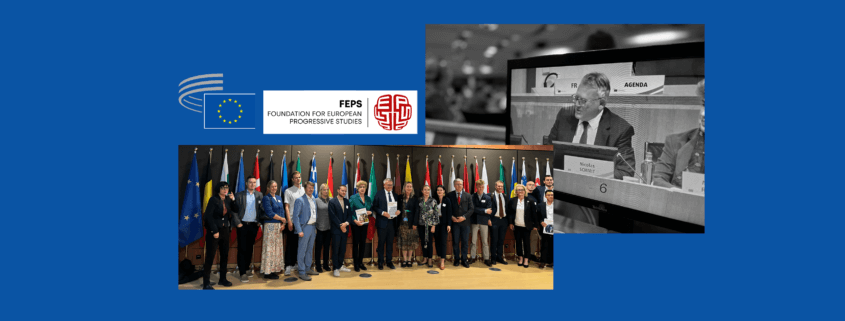Algorithmic Management under scrutiny: “We are all data workers now”
“Today’s worker, once familiar with conventional hierarchies and tangible company structures, now finds their daily rhythms orchestrated by electronic algorithms, and their economic worth and performance appraised by often invisible and “black-box” lines of code.”
The quote is from “Algorithms by and for the workers,” a policy study published by the Foundation for European Progressive Studies (FEPS) that reflects on the complex interplay between technology and work, focusing on the impacts of Algorithmic Management (AM).
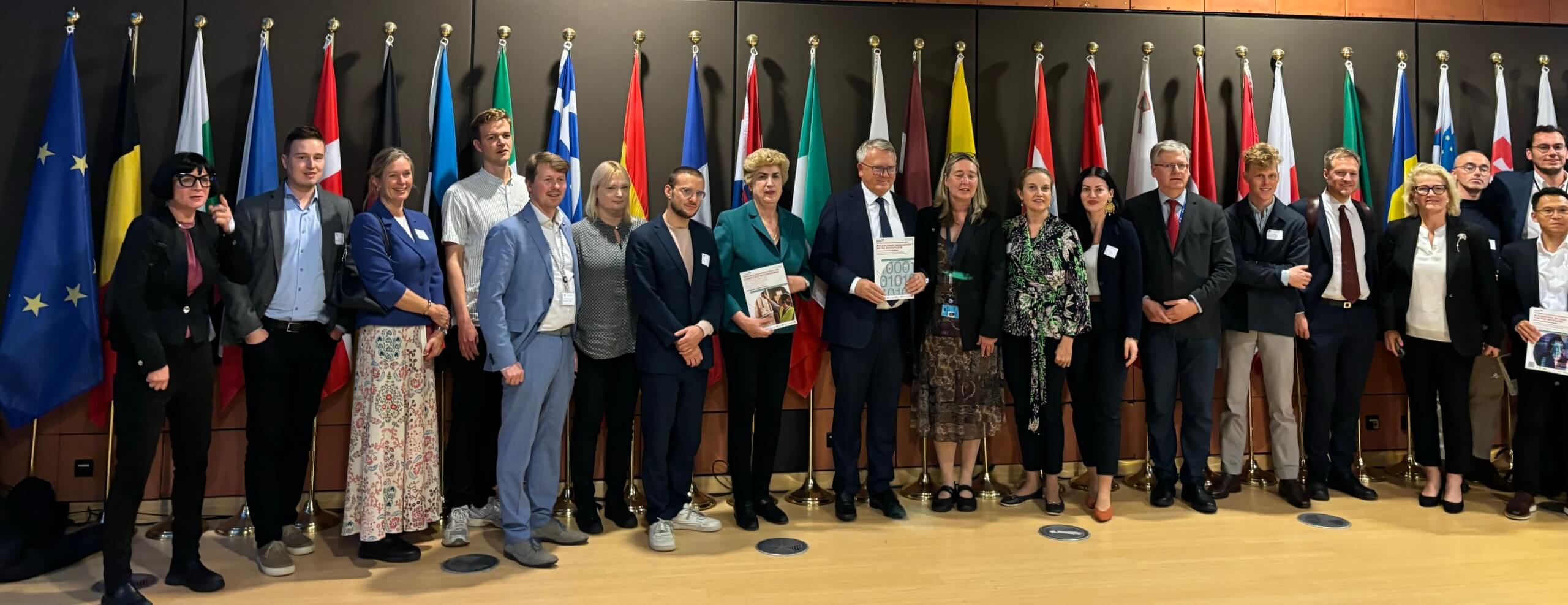
Digital transformations are affecting labour markets at an unprecedented pace, and AM is probably one of the most potent and dangerous AI tools in the world of work. It consists of digital functionalities aimed mainly at increasing productivity.
In that sense, the half-day policy conference organised by the European Economic and Social Committee (EESC) Workers’ Group and the Foundation for European Progressive Studies (FEPS) on 16 October 2024 emphasized a common goal: fostering a responsible, human-centered approach to Artificial Intelligence (AI) in the workplace. CEC European Managers and prominent EU leaders attended.
Stakeholders, university professors, researchers, and EU representatives engaged in a meaningful dialogue about AI’s impact on labour, human rights, and the future of work in Europe.
The core topic of the event was the use of Artificial Intelligence algorithms to monitor and manage workers, especially in the context of the Platform Work Directive, which EU Commissioner Nicolas Schmit presented as a significant achievement after a long debate at the Council of the European Union.
The EESC event occurred just a few hours after the Council adopted new rules to improve working conditions for the more than 28 million people employed in digital labour platforms across the EU.
The directive aims to make algorithms in human resources management more transparent, ensuring that automated systems are monitored by qualified staff and that workers have the right to contest automated decisions.
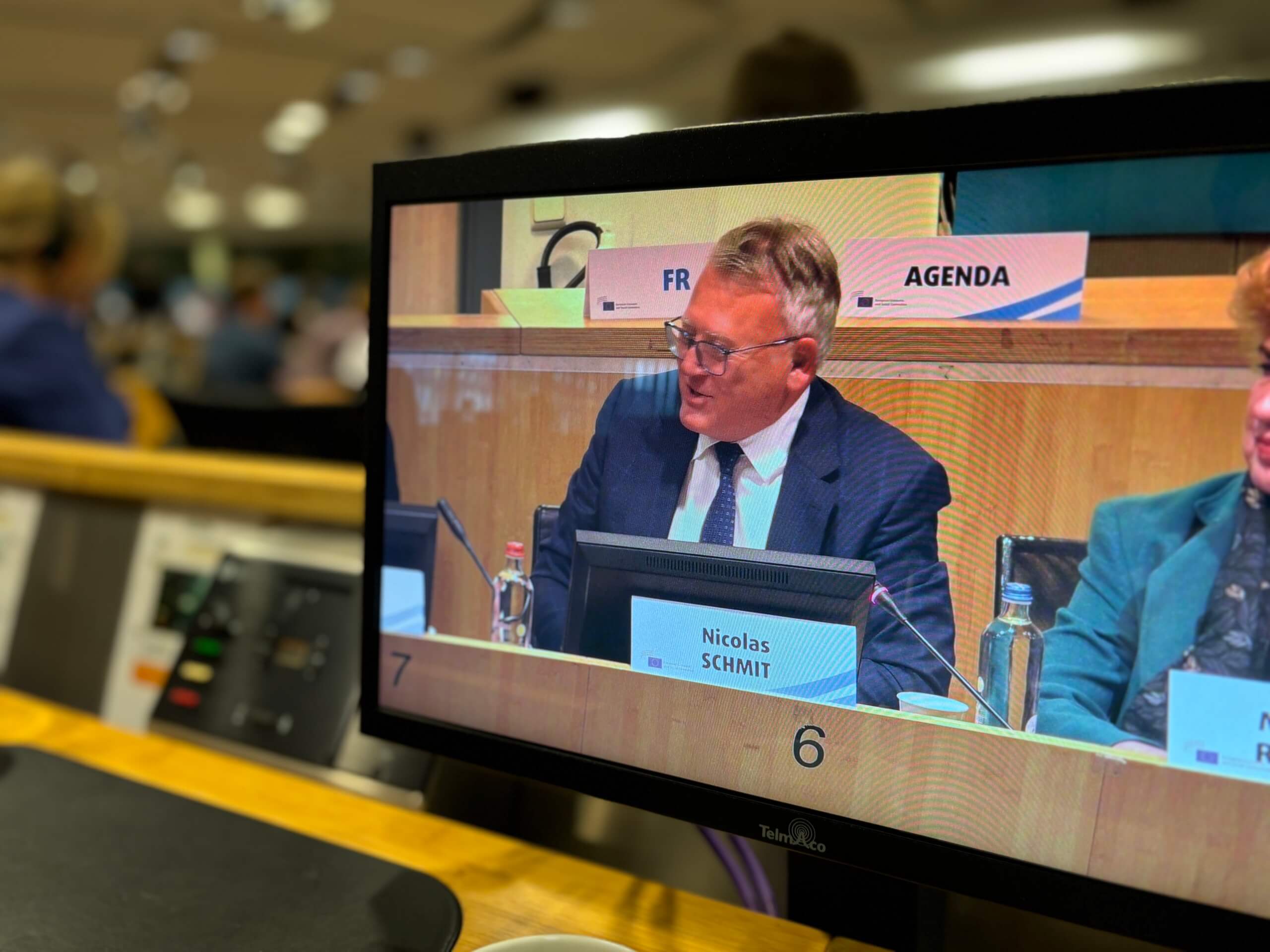
Artificial Intelligence: Risks and rewards
Lucie Studničná, President of the EESC Workers’ Group, opened the conference by highlighting AI‘s increasing role across industries of all sizes.
She emphasized that while AI offers immense potential for improving workplace productivity, it also brings challenges.
AI is more than just a tool; it’s transforming the workplace
Lucie Studničná, President of the EESC Workers’ Group
President of the EESC Workers’ Group
Studničná showcased how lower-wage workers are disproportionately impacted—up to 40 times more than their higher-wage counterparts and underscored the importance of social dialogue.
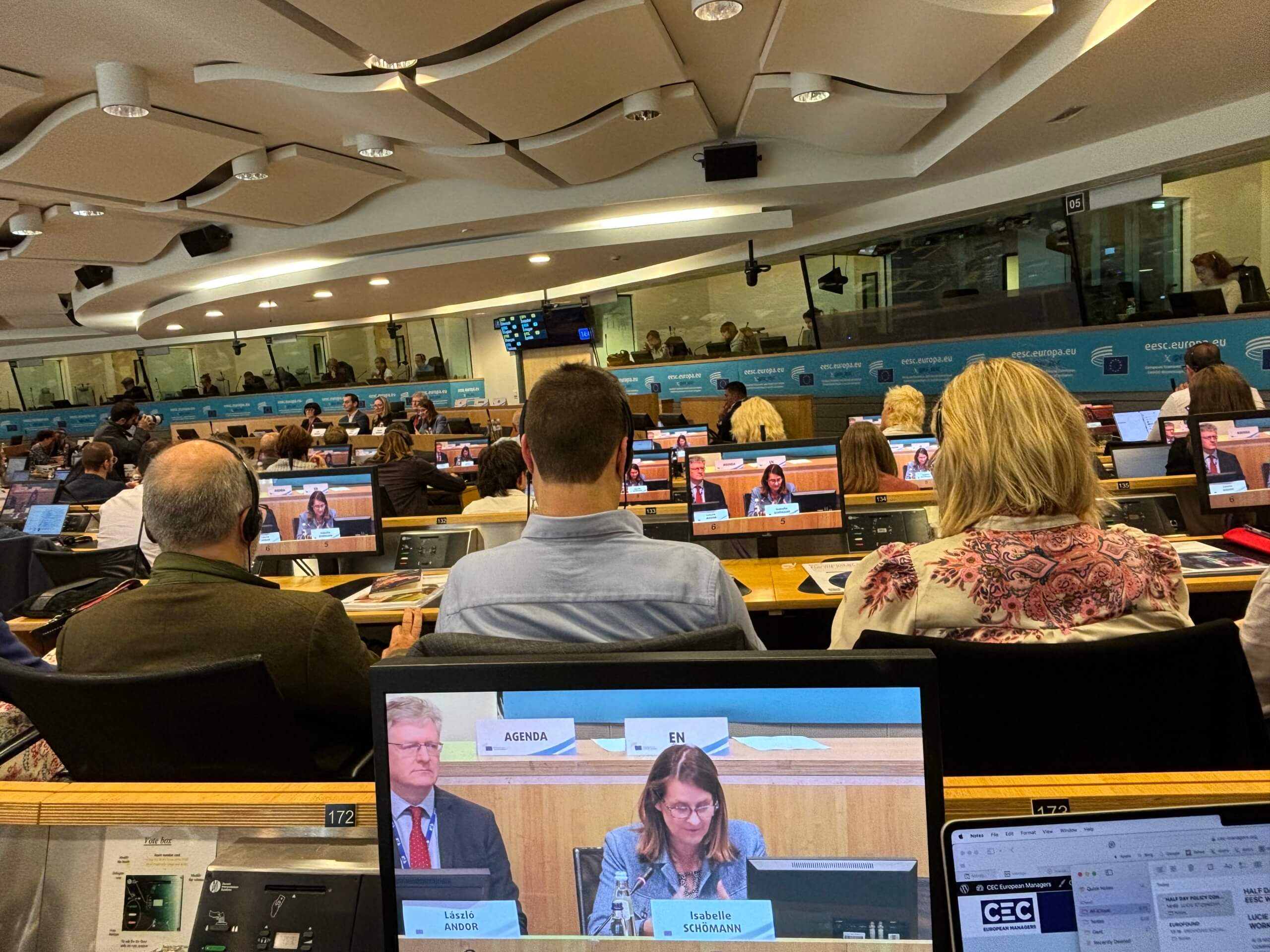
“Trade unions are crucial in promoting a human-in-control approach that prioritizes worker autonomy,” she stated.
David Rinaldi, FEPS Director of Studies and Policy, shared insights into how algorithmic management is now commonly used to assign tasks, schedule shifts, and track performance.
According to Rinaldi, “42% of workers reported that AI tracks their performance and monitors their work speed, often leading to decreased job satisfaction, increased stress, and heightened job insecurity”.
Such findings underscore the need for transparency and collaboration between managers and employees to mitigate AI’s negative effects.
42% of workers have reported that AI tracks their performance and monitors their work speed
David Rinaldi
FEPS Director of Studies and Policy
Social and ethical dimensions of AI
The social implications of AI and algorithmic management were focal points of the discussion. Laszlo Andor, FEPS Secretary-General and former EU Commissioner for Social Affairs, stressed that “social dimensions should remain at the forefront of Europe’s AI policy.”
He cautioned against a narrow focus on competitiveness, advocating for AI policies that promote full employment, worker protection, and environmental sustainability.
Social dimensions should remain at the forefront of Europe’s AI policy
Laszlo Andor
FEPS Secretary-General
Former EU Commissioner for Social Affairs
Andor called for an AI strategy that reflects European social values and ensures that AI serves society’s broader interests.
Isabelle Schömann, Deputy General Secretary of the European Trade Union Confederation (ETUC), highlighted the ethical issues surrounding AI, warning against a “digital form of modern slavery.”
She defended that “Social” is the most crucial adjective in the EU, as it is the essential principle of Article 3 of the treaties, which conveys policymakers and institutions to work for full employment and a social market economy. “We must prevent any harm to the workers; we don’t want modern slavery in Europe,” she said.
Workers should have control over their own data, which is frequently sold to third parties for profit.
Isabelle Schömann
Deputy General Secretary of the European Trade Union Confederation (ETUC)
Schömann advocated for a framework where AI serves the social market economy. She argued that the EU’s AI Act falls short of worker protections, noting that AI-driven workplace surveillance often infringes on privacy rights and can lead to exploitation.
Comparing AI-driven management to the principles of Taylorism, Schömann emphasized that modern leaders must be prepared to engage in collective bargaining and ensure that AI enhances, not exploits, labour conditions.
“AI and Taylorism have much in common,” she noted. “We need to equip leaders and managers to negotiate in this new landscape, where algorithms increasingly monitor workers.”
Challenges in AI implementation: Consent, privacy, and data rights
The conference also addressed the broader implications of data privacy and consent within AI-driven workplaces.
Phoebe V. Moore, a professor at the University of Essex who specializes in the future of work, expressed concern over the lack of worker autonomy in settings where AI monitors performance and behavior. “Consent is becoming almost impossible to obtain meaningfully,” Moore said, adding that “More than 50% of corporations are using some kind of monitoring.”
We are witnessing the privatisation of privacy rights, where workers’ data is used to control and exploit them.
Phoebe V. Moore
Professor at the University of Essex
Finally, Moore reflected on the ownership of our privacy and the current GDPR and AI Act legislations. “Just because I have access to my data, does that mean that I’m the owner of it? There’s a lot of risk for victimization,” she said.
These discussions reflected insights from CEC European Managers’ Position paper: Leadership and partnerships for purposeful AI, highlighting the importance of a values-based approach to AI in the workplace.

CEC European Managers advocates for a human-centered Artificial Intelligence model that prioritizes transparency, ethical considerations, and respect for workers’ rights.
Our confederation’s commitment to ethical AI is reflected in our call for company-level AI ethics committees to oversee AI deployments and ensure they align with human rights principles.
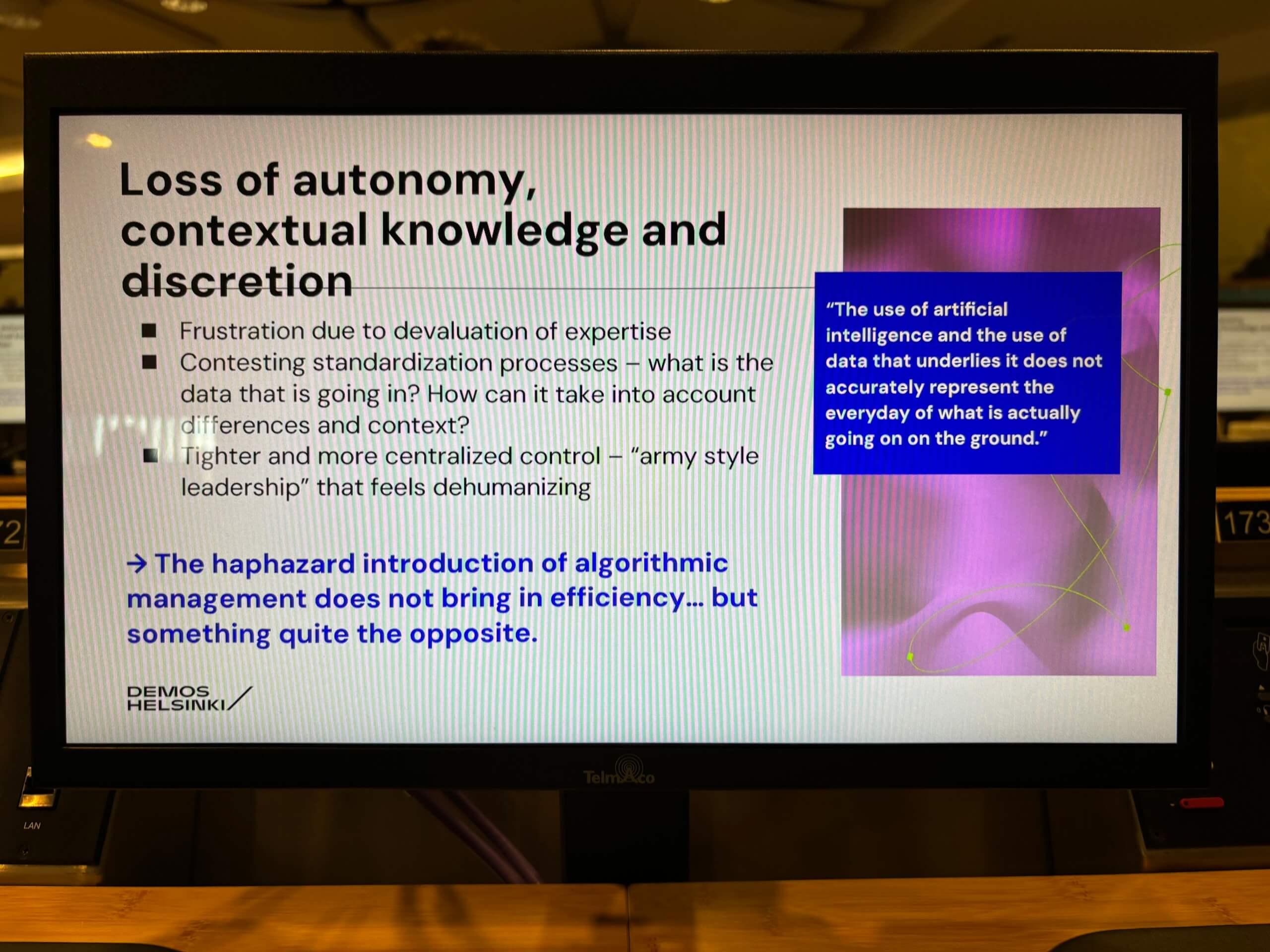
“We are all data workers now”
Theo Cox and Tereza Østbø Kuldova highlighted algorithms’ transformative—and potentially exploitative—nature in modern workplaces.
In a statement that resonated with many in attendance, they asserted, “We are all data workers now.”
Their presentation underscored how algorithms have embedded themselves into nearly every aspect of the work environment, from task allocation to employee monitoring, making workers part of a vast data system designed to optimize productivity and efficiency.
Nicolas Schmit, EU Commissioner for Jobs and Social Rights, also addressed the conference and celebrated the new EU rules agreed upon by the Council.
He said these rules “are designed to make algorithmic management more transparent by ensuring that AI-driven human resources systems are supervised by qualified staff, with provisions that allow workers to challenge algorithm-based decisions.”
The regulation mandates that workers have access to transparent information on how algorithms make decisions that may affect their job security, performance evaluations, and workload.
With these protections, we aim to bring greater fairness and accountability to workplaces increasingly governed by AI.
Nicolas Schmit
EU Commissioner for Jobs and Social Rights
Europe tends to have robust regulatory frameworks, yet risks are seen as stifling innovation.
Nevertheless, Nobel Prize-winning researchers have recently underscored the urgent need for AI regulation, warning, “We must start regulating before it’s too late. We can not accept platforms reading our feelings and emotions.”
Schmit pointed out that AI presents an additional layer of complexity for managers and leaders.
“For managers, AI is perhaps more a black box than for the rest of the employees,” he remarked, emphasizing the need for education and regulation to ensure managers can effectively navigate the ethical and logistical challenges of AI oversight in the workplace.
A responsible AI framework for Europe
The conference concluded with Maria João Rodrigues, President of FEPS, calling for an urgent and coordinated EU-level initiative to shape AI policy.
Rodrigues stressed that while technological progress is unstoppable, it must be accompanied by regulations safeguarding human rights and worker dignity.
She highlighted the recent passing of the Platform Workers’ Directive by the EU Council as a policy aimed at enhancing transparency in AI-driven human resources management across the bloc.
Lucie Studničná closed the event by reiterating the need for continuous dialogue and collaborative action, thanking attendees for their contributions to an “essential and enriching debate.”
She emphasized that Europe can set a global standard for responsible AI use by integrating social, ethical, and environmental considerations into its AI policies.
Let’s regulate AI. Let’s set a good standard for the world
Maria João Rodrigues
President of FEPS
Events like this EESC-FEPS conference are crucial for fostering dialogue and cooperation among social partners, EU institutions, think tanks, and stakeholders.
CEC European Managers’ role
As human managers, we must remain open to participating in and contributing our expertise to the AI regulation debate and assessing the risks that Algorithmic management entails.
Through collective efforts and sustained commitment, Europe aims to harness AI’s potential while preserving its core values of human dignity, equality, and social justice.

